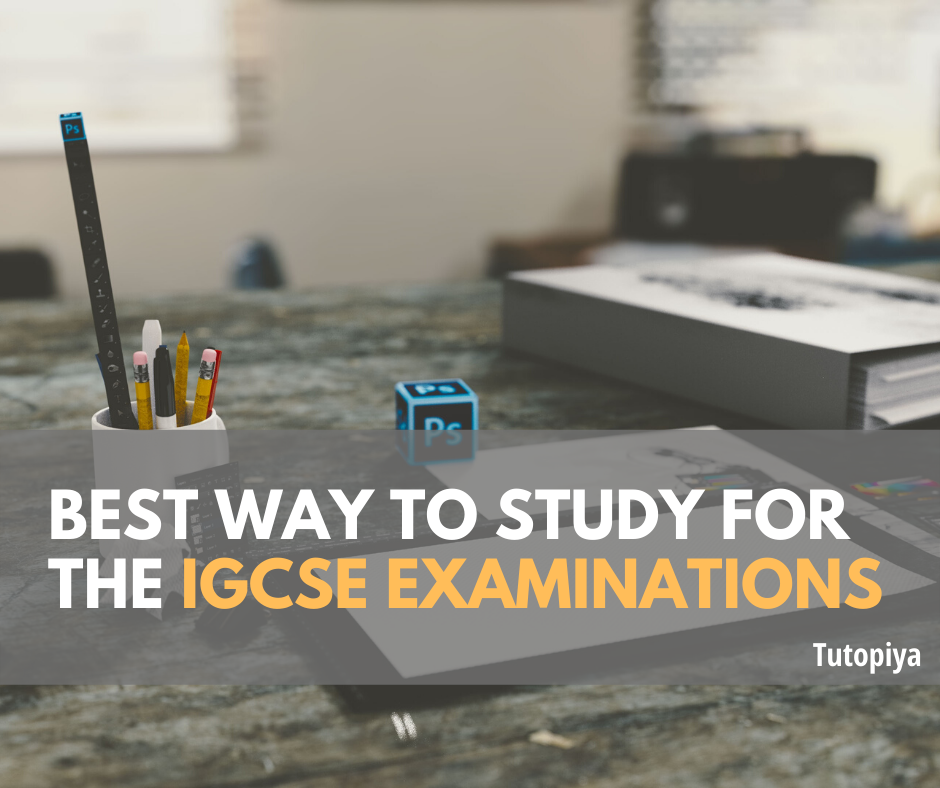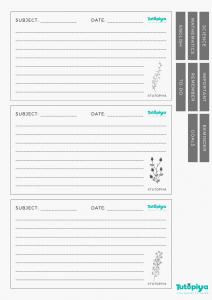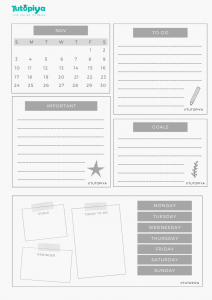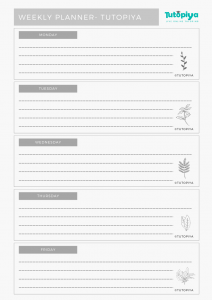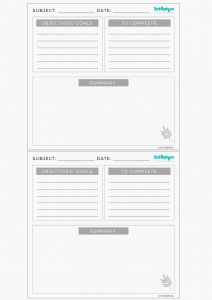Looking for the best way to study for IGCSE? Tutopiya has written a comprehensive guide to help our IGCSE students to achieve the best results for their upcoming examination.
Find a summarised infographic at the bottom of the article.
1. Building A Revision Timetable
Build yourself a revision timetable two months or three before your IGCSE examinations. List all the IGCSE subjects and topics tested for the exam. Make sure to designate sufficient time for all your subjects especially the weaker subjects.
Having a revision timetable will help you to know which subjects need to be prioritised. You can also make use of daily or weekly study planners to guide you through your revision period.
Allocate your time for each subject diligently. There bound to be some subjects that you are strong in and some that you are weak in. You have to dedicate more and enough time for your weaker subjects to bridge the knowledge gap you have of that subject.
It is also good to plan every day the day before. Plan what you are going to finish revising today, be it reading through your notes or going through the questions you got wrong in class. It is good to be efficient with your time by planning ahead.
Setting a goal before your study session is a good way to keep yourself on track. You will be able to review your progress and be prepared for the examinations.
These study planners will help you identify the goals and objectives of your study session. Tutopiya has some free downloadable study planners for our students and readers. These printables are made in-house.
Tutopiya has a quick guide to help you study with planners, read the blog here. Tutopiya has also made some in-house study planner templates for our students and readers. You can download them here!
2. Use Study Tools to Connect Ideas
Mind Maps
Should you find it difficult to summarise a topic or remember a ton of new study notes, Mind Maps can be a very useful tool to help you retain this information.
Mind Maps summarises the key points and shows you a thorough overview of the topics with clear headings.
Mind Mapping helps with explanation by making associations to connect ideas helping you to structure information in a logical and coherent manner. This helps you to memorise or remember the information easier.
“If you can’t summarise it, you don’t know it!”
Note Taking
More often than not, we convince ourselves that we don’t have to write down notes and that we can remember. Of course, we can remember on the spot, but without reinforcing your memory by taking it down, you will highly likely forget about it.
Note-taking does not mean writing down everything your teacher says, listen to the things that he or she has to say about the topics.
Note down the key concepts, equations or even examples that your teacher has gone through in class.
Note Taking is such an important skill to have. Learning to pick out what is important during the lesson is another important skill. Note Taking does not stop when the class ends. You have to make the effort to go home to review them and connect the ideas to your textbooks. When reviewing your notes, you can check your understanding of the concepts that were being taught. You can always jot down any questions or doubts you have of the concepts and bring them back to the next lesson to your teacher.
3. Understand Your Learning Style
Everybody has their own set of learning style that they find suits them the most. Some may prefer to stay at home to study or some may study better when they are outside. Understanding your learning style may take many trials and errors. The most suitable studying pattern for you is the most effective way to study.
Other than knowing which studying environment is best for you, it is also good to know which studying tool suits you or helps you the best. When you have figured out whether you are a visual, auditory, reading/writing or kinaesthetic learner, you will be able to remember and retain new information better and faster.
4. Enroll in an IGCSE Grades booster program
There are Booster programs conducted by industry experts. Their expertise and experience are used in packaging effective and powerful revision programs that will help students up the game in Examinations.
Save your time and energy and attain strategies and techniques that will help you with preparing for IGCSE by enrolling in such programs.
The IGCSE Grades booster program is one such program not to miss.
The program provides rich knowledge and information that will be a timely asset during your IGCSE revision process.
5. Practice, Practice, Practice
Many IGCSE students recommend practising more on doing past practice papers instead of only doing what is in the textbook. This could possibly be the best way to study for IGCSE. Questions in your textbook mostly test on the fundamentals concepts whereas practice papers are the real deal.
Run through as many past IGCSE papers as you can. Practising past papers will help you become familiar with the exam question structure and style as well as exam format.
Tip: Try not to cram more than 3 practice papers a day. Refrain from waiting until the last minute and finish all the practice papers.
You can find the practice papers online at Cambridge IGCSE Past Exam Papers.
When you are doing these past examination papers, time yourself and prep yourself like how you would for the actual examination. This will give you a realistic feel to how the actual examination would be like when you are sitting for it.
After much practice, you will find yourself more comfortable handling the time pressure. This will help to improve your overall ability to answer the questions during the examination.
After finishing, mark your answers diligently against the answer sheet. This is because, the questions of the papers over the years may be similar, therefore, the answers would most likely be very similar too. The answer sheet is also a model and guide to help you identify what Cambridge wants from you when YOU are answering those questions.
Remember to keep and file all these practice papers that you have done for reviewing and revising.
6. Day of Your IGCSE Exam
The day or night before your IGCSE examinations can be very stressful as well as nerve-wracking for many of you. There are some ways to help you overcome nervousness and anxiousness that you feel.
Tip 1 – Have A Good Night’s Rest
The best way to study for IGCSE is the night before your IGCSE exam, you do not want to be burning the midnight’s oil and sacrificing your sleep for tomorrow’s examination. Sleeping is not just resting your body and mind, sleeping helps you to retain information that you have taken in during the day.
According to Sleep Foundation, “Scientists think that when we sleep, memories and skills are shifted to a more efficient and permanent brain region, making for higher proficiency the next day.”
Tip 2 – Double-Check
Check the venue, time and date of the examination to make sure you did not confuse yourself or make a mistake. Make sure to also bring any required tools or materials for the paper, your ID, entry proof, stationary, etc.
Tip 3 – Be Early
Wake up early on the day of your examination to so you have sufficient time to get ready as well as grab breakfast.
Make your way to the examination venue early in case of any unexpected events that can occur on the way to the venue.
Tip 4 – Read The Questions Carefully
When you can start doing the paper, do not panic and read all the questions carefully before you write down your answer or solution. Some questions can be really tricky and hard to grasp at first glance.
Tip 5 – Skip The Questions
Skip the questions that you are unable to solve immediately. Get back to these questions when you have reached the end of the paper. Try not to spend too much time on questions that do not have many marks allocated to them, eg. Multiple Choice Questions.
Tip 6 – Make Use of Every Minute
Every minute during the examination is very precious. Even when you have finished the paper, remember to check the paper again. Run through all the questions and make sure you have not overlooked certain keywords or key points the questions are looking for.
Suggestion: Start checking from the back of the paper where most marks are allocated to. This way, even if you do not have enough time to check for the MCQs, you have time to check those heavy weightage questions.
Tip 7 – Move On
After the paper is over, do not look back and dwell on the questions you did not do well. You need to keep your focus for the next paper and try extra hard for the upcoming paper.
Other Useful Resources For You
Read our other IGCSE-related article on our blog page here! Read another article on Tips to help Ace your IGCSE English Paper 3.
The best way to study for IGCSE is summarised into 6 points below.
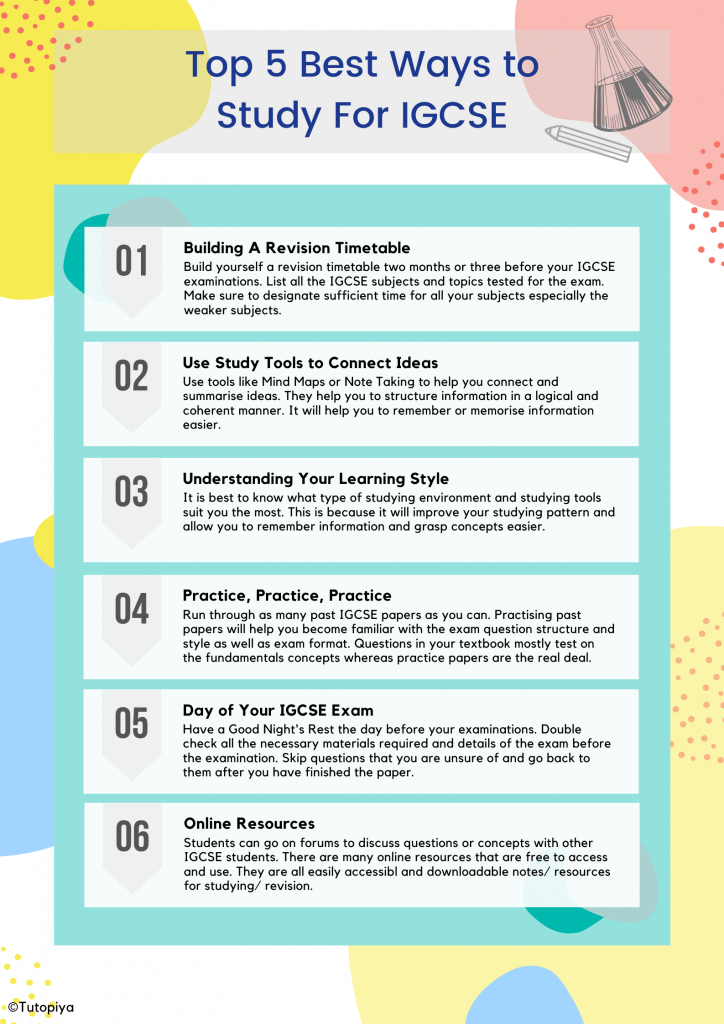
About Tutopiya
Tutopiya is a 1-1 Live Online Tutoring Platform that offers the International Curriculum like IGCSE, IB and many other curriculums. Tutopiya also provides bridging courses for students transitioning to IB from IGCSE. Sign up for a FREE 60 minutes trial today or simply fill up a trial form to receive your FREE trial!
Enroll in our IGCSE Grades booster program today!
